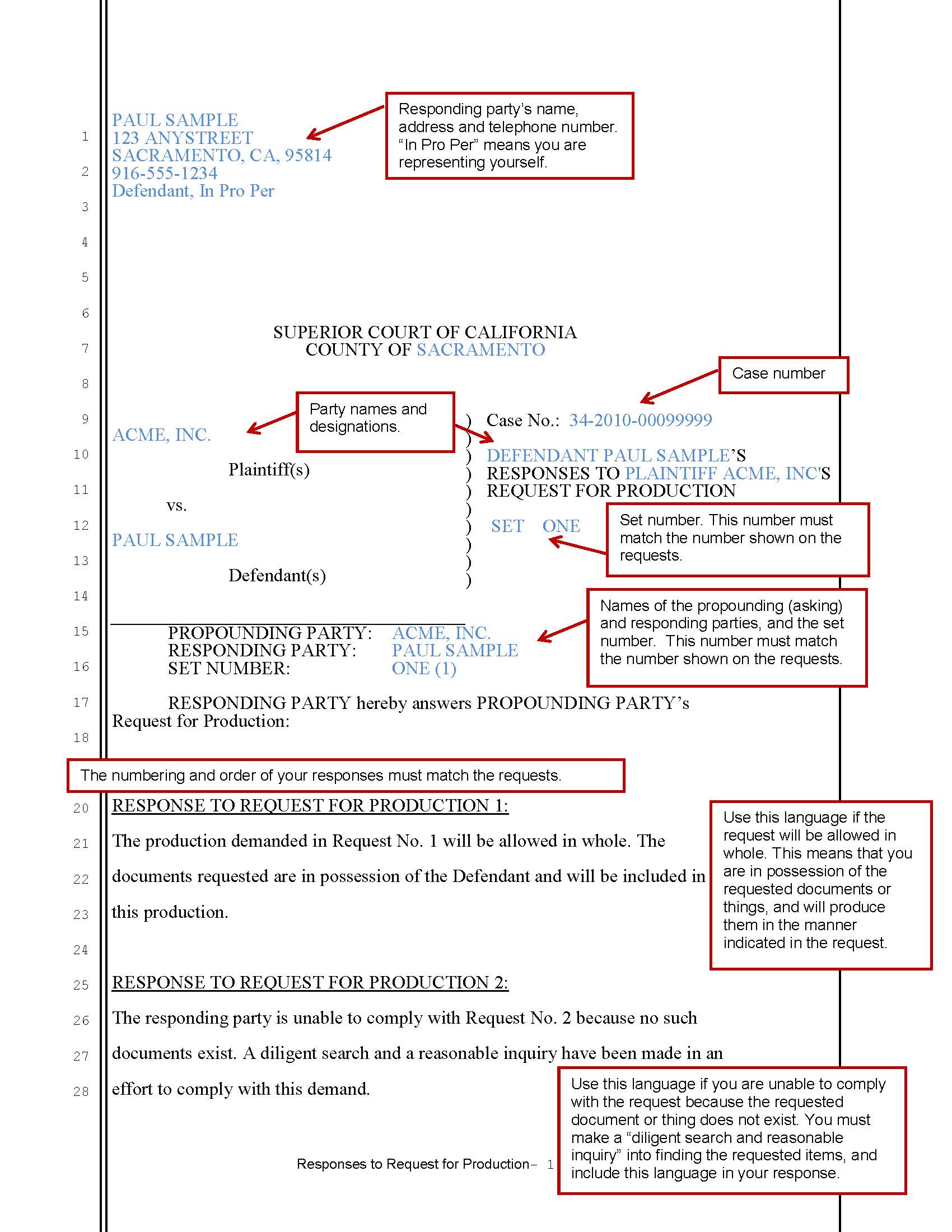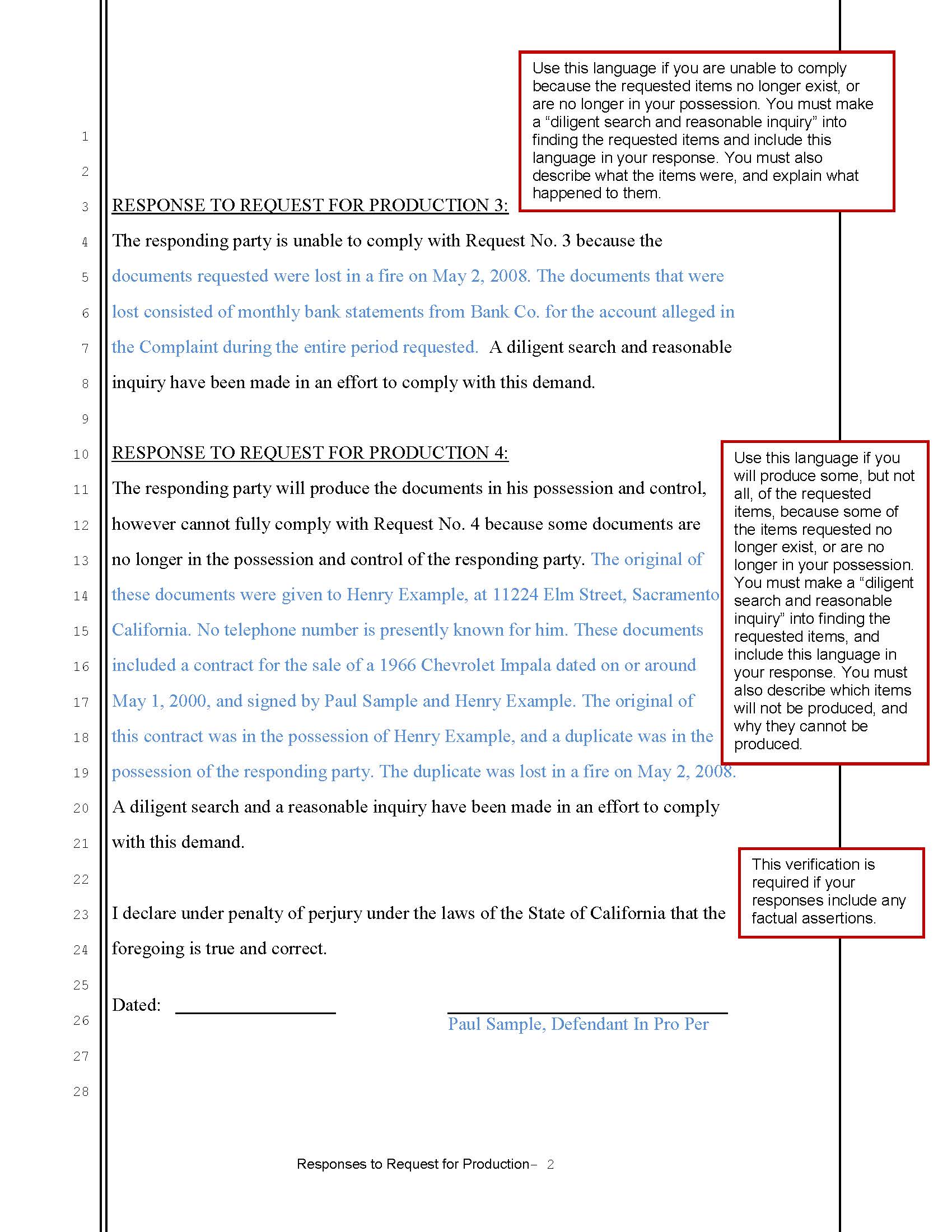Discovery: Responding to Requests for Production or Inspection
Requests for production may be used to inspect and copy documents or tangible items held by another party. Although these requests are most commonly used to obtain copies of documents, they can also be used to test, measure, photograph, etc., any type of physical evidence in the other party’s possession or control. Generally, a request for production of documents asks the responding party to make available the original documents, but the propounding (asking) party may request that photocopies be sent instead, if inspection of the original document is not necessary.
Templates and Forms
The requests you receive should include very specific information about what you are being asked to do, such as sending photocopies of documents to the other party; delivering original documents to a specific location, such as a copy shop, at a particular date and time; or allowing the other party to inspect documents or things in their current location at a specific time. The requests will also include a list of documents or things, or categories of documents or things, you are asked to produce or allow to be inspected.
Your response to a request for production consists of two parts:
- One part is a written response to the requests, in which you state under penalty of perjury that you will produce the requested items; that you will not produce and why; or that you object to a request on legal grounds.
- The second part of your response is the actual production of the requested documents or things in the manner specified in the requests.
Step-by-Step Instructions
1
Complete Your Written Responses
There is no Judicial Council form specifically for this procedure. Instead, the relevant document must be typed on 28-line pleading paper. A customizable template may be downloaded from this link:
A sample completed written response is available at the end of this Guide.
You have 30 days from the date the requests were served to serve your written response. Your response for each request must include either an agreement to comply, a representation of your ability to reply, or an objection to all or part of the request. California Code of Civil Procedure (CCP) §§ 2031.210 et. seq require specific statements in your response. The sample at the end of this Guide includes the four most common responses to a request for production, and includes the legally required statements. Use the sample as a guide for writing your own responses, to ensure that you are including all of the required statements. For each request, you will state one of the following:
- That the request will be allowed in whole. (CCP § 2031.220). This means that you are in possession of the requested documents or things, and will produce them in the manner indicated in the request;
- That you are unable to comply with the request, because the requested document or thing has never existed. (CCP § 2031.230). You must make a “diligent search and reasonable inquiry” into finding the requested items, and state in your response that you have made this effort;
- That you are unable to comply because the requested items no longer exist, or are no longer in your possession. (CCP § 2031.230).You must make a “diligent search and reasonable inquiry” into finding the requested items, and state in your response that you have made this effort. You must also describe what the items were, and explain what happened to them. If known, you must include the name and address of the person or organization in possession of the requested items; or
- That you will produce some, but not all, of the requested items, because some of the requested items no longer exist, or are no longer in your possession. (CCP § 2031.230). You must make a “diligent search and reasonable inquiry” into finding the requested items, and state in your response that you have made this effort. You must describe which items will not be produced, and why they cannot be produced.
Objections
Sometimes, rather than responding about your ability to produce the requested documents or things, you may object to the request on legal grounds. Common objections to requests for production or inspection include:
- The request is overly broad or unduly burdensome. The propounding (requesting) party must include enough information to make the requested documents easily identifiable. This may include information about how the requested documents are likely stored, indexed, or otherwise accessible. You may object to a request if it would require an extreme amount of work to identify and produce the requested items. For example, if the other party asks you to produce “any and all records from your bank account,” you may want to object, as this request is overly broad, and it is unduly burdensome for you to locate and produce every document you have ever received from your bank since you opened the account.
- The request is vague, ambiguous, or unintelligible. Sometimes, it is impossible to determine what the propounding party is asking you to produce. In these situations, you may object to the request on the grounds that it is vague, ambiguous, or unintelligible. For example, if the request just reads, “Produce the documents you showed me,” the request would be vague or ambiguous, since you might have shown the requesting party many documents on numerous occasions. If the request makes no sense, such as “Produce the admit you were on October 15, 2013,” the request is unintelligible, as the requesting party likely mixed together several different items, resulting in something that makes no sense.
- The request is not reasonably calculated to lead to the discovery of relevant, admissible evidence. All requests for production must be relevant to the issues in the case. If a request does not lead to the discovery of relevant, admissible evidence, you may object. For example, in a car accident case, if the propounding party asks you to produce all account statements for your checking account for the past five years, you may want to object to the request. Unless your banking habits relate to the accident, this request will not likely lead to relevant evidence in the case.
There are many other objections that may be raised in your response to requests for production. See the resources listed at the end of this Guide for more information. If only a part of the request is objectionable, you are required to comply with the portion of the request that is not objectionable. (CCP § 2031.240).
Unless your written response includes only objections without any factual assertions, it must be verified. This means it must include a statement under the penalty of perjury that your response is true and correct. (CCP § 2031.250). Failure to include this verification has the same effect as not responding at all.
2
Make Copies
Make one photocopy of your response for yourself and one for each party in the case, other than the propounding party. The propounding party will receive your original response.
3
Have Your Response Served
Your original written response must be served on the attorney for the propounding party, or directly to the propounding party if he or she is self-represented (in pro per). Courtesy copies should be served on all other attorneys or self-represented parties in the case. Service may be completed by mail, by a person over the age of 18 who is not a party to the case. The person serving your requests must complete a proof of service form, typically a Proof of Service by First Class Mail (POS-030). For more information, see our guide on Proof of Service by Mail.
4
Retain Your Response and Proof of Service
Retain a photocopy of your written response and the original signed proof of service for your records. You do not need to file your response or proof of service with the court. If the other party claims you did not respond, you may use these documents to defend yourself against a Motion to Compel. For more information, see our guide on Motion to Compel.
5
Produce the Requested Documents and Things
You must provide the propounding party with access to the requested documents and things at the time and location indicated in the request for production. Other parties in the case may be present at the specified time and location to perform their own inspections. However, if the other parties wish to have access to the documents or things at a different time or location, they will need to propound their own request for production.
If the propounding party indicated that they would accept photocopies of documents, you may mail these photocopies to the attorney for the propounding party, or directly to the propounding party if he or she is self-represented (in pro per), at the same time as your written response, or separately. Although not required, many attorneys provide copies of the requested documents to all parties in the case, because it helps streamline litigation and reduces duplicative demands for inspection.
For More Information
On the Web
Introduction to Discovery – Part 9: Responding to Requests for Production
Part 9 of this video series from SH@LL (then known as Civil Self-Help Center) will help you understand what Requests for Production are, and how to respond to these types of requests.
At the Law Library
California Civil Discovery KFC 1020 .H64
Electronic Access: On the Law Library’s computers, using Lexis Advance.
California Civil Discovery Practice KFC 1020 .C35
Electronic Access: On the Law Library’s computers, using OnLaw.
California Civil Litigation and Discovery KFC 995 .G674
California Deposition and Discovery Practice KFC 1020 .D44
Electronic Access: On the Law Library’s computers, using Lexis Advance.
California Discovery Citations KFC 1020 .F56
California Forms of Pleading and Practice KFC 1010 .A65 C3 (Ready Reference)
Electronic Access: On the Law Library’s computers, using Lexis Advance.
California Practice Guide: Civil Procedure Before Trial KFC 995 .W45
Matthew Bender Practice Guide: California Civil Discovery KFC 1020 .M37
Electronic Access: On the Law Library’s computers, using Lexis Advance.
Samples


This material is intended as general information only. Your case may have factors requiring different procedures or forms. The information and instructions are provided for use in the Sacramento County Superior Court. Please keep in mind that each court may have different requirements. If you need further assistance consult a lawyer.




